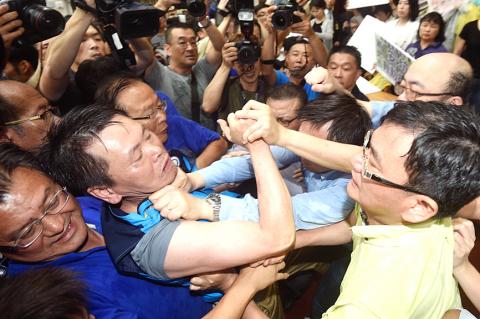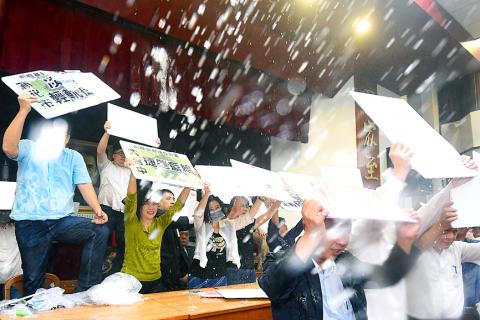All hell broke loose at the legislature yesterday after the Chinese Nationalist Party (KMT) caucus bombarded Democratic Progressive Party (DPP) lawmakers with water balloons, flour and eggs, prompting the DPP caucus to rush budget proposals for the Forward-looking Infrastructure Development Program and 126 motions through committee review.
KMT caucus members first tried to filibuster the proceedings.
However, as soon as the last KMT lawmaker finished speaking, DPP Legislator Wang Jung-chang (王榮璋), who chaired the meeting, instructed an emcee to read the motions tendered by the DPP, the New Power Party (NPP) and the People First Party (PFP).

Photo: Liao Chen-huei, Taipei Times
KMT lawmakers had arrived armed with bags full of water balloons for such a moment and they began to hurl them at the DPP lawmakers at the rostrum.
Water balloons flew across room, hitting several fluorescent lights before smashing against the proscenium above the rostrum.
Water trickled down onto the DPP legislators, some of whom then donned raincoats, while others tried to fend off more balloons with placards while getting soaked.

Photo: Liao Chen-huei, Taipei Times
A bag of flour was also thrown and exploded on the board.
While most KMT lawmakers appeared to be aiming for the proscenium, KMT Legislator Chang Li-shan (張麗善) took aim at DPP Legislator Ho Hsin-chun (何欣純), triggering a scolding from Ho.
KMT caucus whip Lin Te-fu (林德福) produced an egg and threatened to throw it.
“Lin Te-fu. Do not throw eggs. Otherwise, you are looking for a fight,” DPP Legislator Chuang Ruei-hsiung (莊瑞雄) said.
KMT Legislator Lin Wei-chou (林為洲) threw the egg instead, but it was Lin Te-fu and KMT Legislator Sra Kacaw, who were standing nearby, who had to deal with the fallout.
DPP lawmakers Chen Ou-po (陳歐珀) and Chiu Chih-wei (邱志偉) charged at Lin Te-fu, pinning him to the floor along with Sra.
Waves of scuffles ensued after the men got back to their feet.
With the meeting descending into total chaos, Wang put to a vote — in the form of a roll call — a DPP motion to send the 126 motions to cross-caucus negotiations next month.
The motion was backed by the DPP caucus, which has the legislative majority.
That angered several KMT lawmakers, who pushed over a desk and tried to drive it toward the rostrum like a siege ram, only to be vigorously blocked by DPP lawmakers.
Lin Wei-chou said that the KMT’s next mission would be to freeze as many unreasonable budget proposals linked to infrastructure development program as it can.
The DPP caucus criticized the KMT’s obstruction and its combative tactics.
“As hot as the weather is, this is the legislature, not a water park,” DPP caucus chief executive Yeh Yi-chin (葉宜津) said.
The “farce” staged by the KMT impeded lawmakers, including those from the DPP, PFP and NPP, from questioning, supervising or downsizing the infrastructure budgets, while allowing them to receive the approval of a cross-committee review without any discussion or modification, she said.
Only 16 KMT lawmakers — less than half of the KMT’s 35 legislators — attended the review, suggesting that most KMT lawmakers supported the infrastructure program, Yeh added.
“The KMT called three caucus meetings, only to discuss whether they should use water balloons or eggs,” DPP caucus secretary-general Lee Chun-yi (李俊俋) said. “Is this the KMT that KMT chairman-elect Wu Den-yih (吳敦義) wants?”
The KMT’s boycott of the budget review was aimed to curry favor with staunch pan-blue supporters, whose opposition to the infrastructure program is intense, Lee said.
Additional reporting by Chen Wei-han

Alain Robert, known as the "French Spider-Man," praised Alex Honnold as exceptionally well-prepared after the US climber completed a free solo ascent of Taipei 101 yesterday. Robert said Honnold's ascent of the 508m-tall skyscraper in just more than one-and-a-half hours without using safety ropes or equipment was a remarkable achievement. "This is my life," he said in an interview conducted in French, adding that he liked the feeling of being "on the edge of danger." The 63-year-old Frenchman climbed Taipei 101 using ropes in December 2004, taking about four hours to reach the top. On a one-to-10 scale of difficulty, Robert said Taipei 101

Nipah virus infection is to be officially listed as a category 5 notifiable infectious disease in Taiwan in March, while clinical treatment guidelines are being formulated, the Centers for Disease Control (CDC) said yesterday. With Nipah infections being reported in other countries and considering its relatively high fatality rate, the centers on Jan. 16 announced that it would be listed as a notifiable infectious disease to bolster the nation’s systematic early warning system and increase public awareness, the CDC said. Bangladesh reported four fatal cases last year in separate districts, with three linked to raw date palm sap consumption, CDC Epidemic Intelligence

Taiwanese and US defense groups are collaborating to introduce deployable, semi-autonomous manufacturing systems for drones and components in a boost to the nation’s supply chain resilience. Taiwan’s G-Tech Optroelectronics Corp subsidiary GTOC and the US’ Aerkomm Inc on Friday announced an agreement with fellow US-based Firestorm Lab to adopt the latter’s xCell, a technology featuring 3D printers fitted in 6.1m container units. The systems enable aerial platforms and parts to be produced in high volumes from dispersed nodes capable of rapid redeployment, to minimize the risk of enemy strikes and to meet field requirements, they said. Firestorm chief technology officer Ian Muceus said

MORE FALL: An investigation into one of Xi’s key cronies, part of a broader ‘anti-corruption’ drive, indicates that he might have a deep distrust in the military, an expert said China’s latest military purge underscores systemic risks in its shift from collective leadership to sole rule under Chinese President Xi Jinping (習近平), and could disrupt its chain of command and military capabilities, a national security official said yesterday. If decisionmaking within the Chinese Communist Party has become “irrational” under one-man rule, the Taiwan Strait and the regional situation must be approached with extreme caution, given unforeseen risks, they added. The anonymous official made the remarks as China’s Central Military Commission Vice Chairman Zhang Youxia (張又俠) and Joint Staff Department Chief of Staff Liu Zhenli (劉振立) were reportedly being investigated for suspected “serious